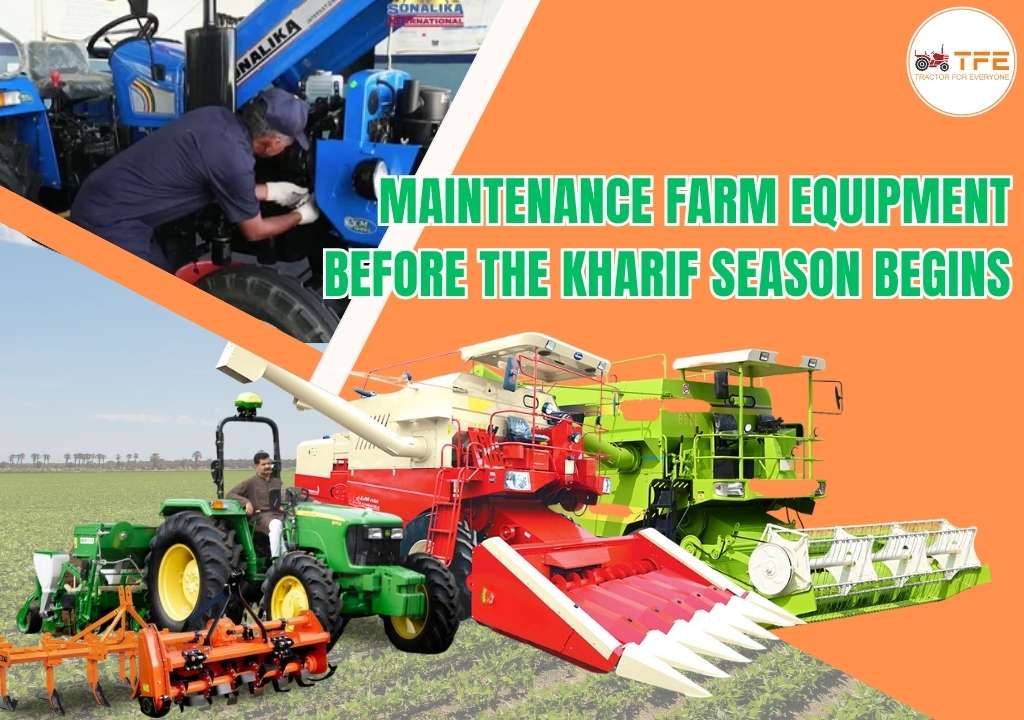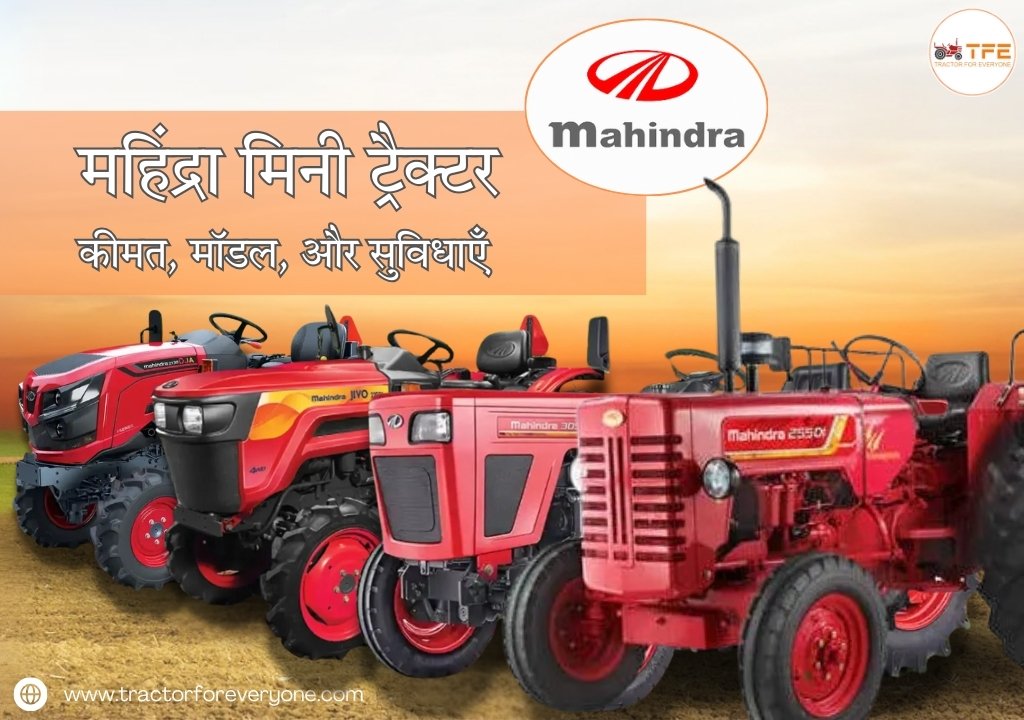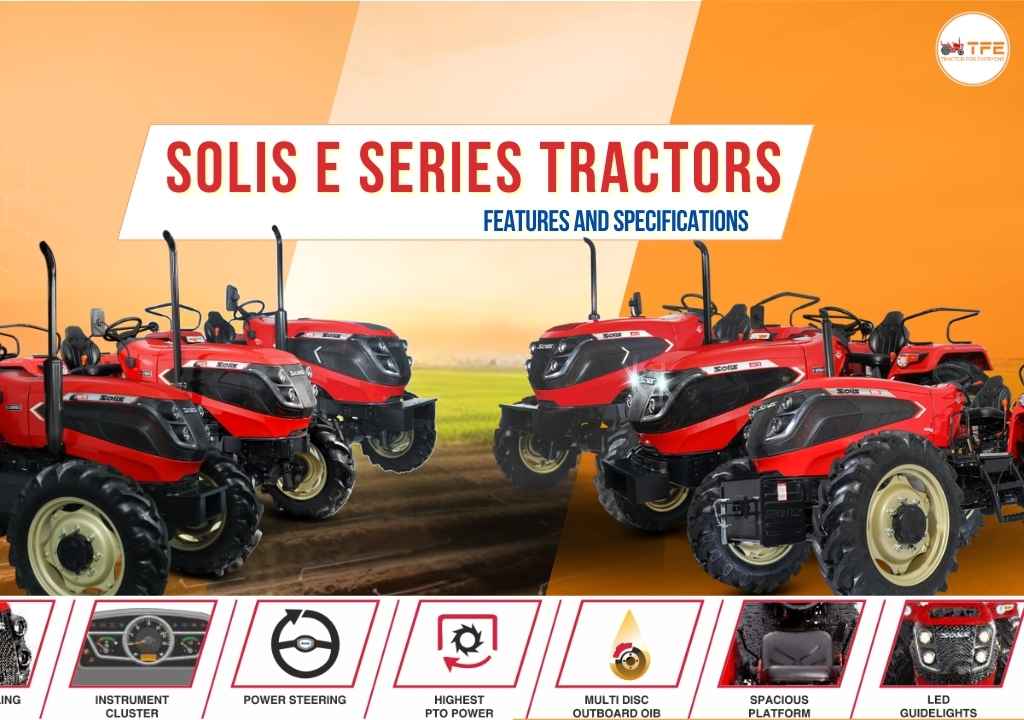Best Used Car, Services, Auto Parts, Rent Car Available for Buy and Sell Near By Go Ahead
- Swaraj Price 2025: Latest Swaraj Tractor Price List and On-Road Rates in India
- Best Kubota Mini Tractors for Orchard and Vineyard Farming
- महिंद्रा मिनी ट्रैक्टर - कीमत, मॉडल, और सुविधाएँ
- Swaraj 855 FE Tractor Review 2025 Features, Price and Performance Explained
- Best Tractors in India 2025: Top 10 Picks for Every Farm Size
- महाराष्ट्र फार्मर आयडी: ऑनलाइन नोंदणी प्रक्रिया, कागदपत्रे आणि फायदे
- Sonalika Tractor Price 2025 Complete List of Models, Series and Latest Offers
- Swaraj Tractor Price List 2025: Best Tractors for Small, Medium & Large Farms
- Swaraj 744 FE Price, Features & On-Road Cost Explained for 2025
- Mahindra Tractors Price 2025: Complete List, Series-Wise Comparison and Best Models

Maintenance Farm Equipment Before The Kharif Season Begins
The Kharif season is one of the most crucial agricultural periods in India, stretching from June to October. This season, which mainly depends on the monsoon, sees the sowing of key crops like rice, maize, and cotton, making it a busy time for farmers. Did you know that maintaining your farm equipment before the Kharif season can boost its efficiency by up to 30%? Proper maintenance ensures that your machinery runs smoothly during peak sowing time, helping you avoid costly breakdowns when it matters most.
In this blog, we’ll discuss how to prepare your tractors, harvesters, and other farm equipment for the Kharif season. We’ll cover essential steps such as cleaning, lubrication, and checking vital components, so your equipment is ready to handle the demands of planting and harvesting. By following these maintenance tips, you can reduce downtime, increase productivity, and get the most out of your Kharif crop.
Proper maintenance of farm equipment not only ensures smooth operations but also helps maximize the yield and efficiency during the Kharif season. Whether it’s tractors, plows, harvesters, or seeders, ensuring these machines are in optimal condition can save you both time and money in the long run. In this blog, we’ll guide you through the key steps to take in preparing your farm machinery for the busy Kharif season, so you can achieve a bountiful harvest.
Why Pre-Kharif Equipment Maintenance Matters
1. Importance of Pre-Kharif Maintenance
Before you dive into sowing your crops, it’s important to carry out a thorough maintenance check on your farm equipment. Studies show that well-maintained machinery can improve productivity by up to 20%, so this investment of time and effort will certainly pay off. By addressing potential issues early on, you can avoid costly breakdowns during critical stages of the Kharif season, which is crucial for ensuring that your crops are sown and harvested on time.
2. Essential Checks for Farm Equipment
Now that we understand the importance of maintenance, let’s look at the key areas you should focus on to ensure your equipment is up to the task:
- Oil Changes: One of the first things you should check is the engine oil. Dirty or old oil can cause your equipment to perform inefficiently or even break down. Change the oil and filters before the start of the Kharif season to keep your machines running smoothly.
- Lubrication: All the moving parts on your machinery- such as belts, chains, and bearings- need to be properly lubricated. Lack of lubrication can cause friction and damage, leading to expensive repairs later on. Make sure to lubricate these parts regularly to avoid breakdowns during planting or harvesting.
- Tires and Hitches: Check your tires for signs of wear and ensure they are inflated to the correct pressure. Incorrect tire pressure can reduce the efficiency of your tractor or harvester. Also, inspect the hitches and other connections to ensure they are secure and functioning correctly.
- Lights and Batteries: It’s easy to overlook, but the lights and batteries on your equipment are critical for safety, especially if you're working in low light conditions. Make sure the lights are working and the batteries are fully charged to avoid disruptions during work.
3. Cleaning Your Equipment
Cleaning your equipment before the Kharif season is equally as important as checking its functionality. Over time, dirt, dust, and debris can cause corrosion and damage to your machinery. Here's how you can clean your equipment effectively:
- Thorough Cleaning: After the harvest season, wash off any dirt, crop residue, and mud that might have accumulated on your equipment. This is essential for preventing rust and ensuring your machines are in optimal condition for the next season.
- Grease Moving Parts: Once cleaned, make sure to grease all moving parts to prevent rust and wear. Pay close attention to parts like axles, bearings, and joints, which are exposed to moisture and strain.
4. Calibration and Adjustments
Farm equipment like seed drills and fertilizer applicators require precise calibration to ensure proper planting and fertilization. Incorrect calibration can lead to uneven crop distribution and reduced yields. Here’s how to go about it:
- Seed Drills: Make sure your seed drills are calibrated to plant at the correct depth and spacing. This will ensure uniform crop growth and reduce wastage.
- Fertilizer Applicators: Check your fertilizer applicators and adjust them to apply the correct amount of fertilizer for your crops. Over- or under-fertilizing can affect the health of your crops, leading to poor growth.
5. Checking for Damages and Wear
Before the busy Kharif season begins, look over your equipment carefully for any signs of wear or damage. The last thing you want is to have your machinery breakdown during sowing or harvesting, so check for the following:
- Hydraulics: Inspect your hydraulic systems for any leaks or damages. Faulty hydraulics can disrupt operations and delay your work.
- Engine and Implements: Look for any signs of damage to the engine or farming implements, such as cracks or excessive wear. Fix these issues early to avoid operational failures.
6. Safety First
Your equipment is not only an investment in your farm’s productivity but also a tool that needs to be operated safely. Always check that safety features, such as emergency stops and guards, are in place and functional. Train your workers on how to operate machinery safely to avoid accidents.
7. Budget for Maintenance Costs
Maintenance costs can vary depending on the horsepower (HP) of your farm equipment. For example:
- 35-50 HP Tractors: Maintenance might cost between ₹10,000 and ₹15,000 after the Kharif season.
- 50-75 HP Tractors: These tractors might incur costs between ₹15,000 and ₹25,000, particularly if repairs are needed for hydraulic systems or electronics.
Setting aside a budget for regular maintenance ensures that you don’t face financial strain when it’s time for repairs. Regular checks and fixes will pay off by preventing major breakdowns during the season.
8. Time-Saving Tips for Quick Maintenance
If time is short, focus on quick maintenance tasks that can still keep your equipment running smoothly:
- Oil Change: A quick oil change is essential to keep your engine in good condition. It can be done in a few hours and will ensure that your machinery runs efficiently.
- Tire Check: Checking and inflating your tires is a quick task that can save you a lot of trouble later.
- Battery Charge: A fully charged battery ensures your tractor or harvester starts up quickly and efficiently.
Having spare parts such as filters, hydraulic fluid, and belts on hand can save you time during the busy Kharif season.
Summary:
As the Kharif season approaches, the key to a successful harvest lies not only in the quality of seeds but in the readiness of your farm equipment. The early preparation of your machinery can make all the difference between a smooth farming experience and unexpected disruptions. Routine maintenance of tractors, seeders, and irrigation systems ensures that you are equipped to handle the demands of sowing and growing.
Investing in these preparations will save you time and money by preventing costly breakdowns during crucial planting and harvesting periods. By maintaining and properly storing your equipment, you ensure its longevity, performance, and reliability throughout the Kharif season. This proactive approach helps you focus more on crop management and less on equipment failures, paving the way for a successful farming season.
Frequently Asked Questions
1. What are the most common issues faced during farm equipment maintenance?
Ans: Common issues include worn-out belts, dull blades, oil leaks, and misaligned parts, all of which can lead to breakdowns during the busy season.
2. How can I extend the lifespan of my tractor?
Ans: Regular cleaning, proper storage, and timely maintenance checks like changing engine oil and fluid can significantly extend the life of your tractor.
3. Why is calibration important for farming machinery?
Ans: Calibration ensures accurate operation of machinery, leading to efficient harvesting, planting, and minimal crop damage.
4. What safety precautions should be taken while maintaining farm equipment?
Ans: Always ensure that the equipment is turned off and locked before performing maintenance. Wearing protective gear and following safety guidelines can prevent accidents.
5. How often should I inspect my farm equipment?
Ans: Inspect equipment before every season, especially before the Kharif season begins, to catch potential issues early and avoid costly repairs.
6. Can I perform maintenance tasks myself, or should I hire a professional?
Ans: Simple tasks like cleaning and oil changes can be done yourself, but for complex issues, it’s recommended to hire a professional to avoid damaging your equipment.
7. How does weather affect the performance of farm equipment?
Ans: Harsh weather conditions like rain, humidity, and extreme temperatures can lead to rust and wear on parts, making it important to store equipment properly.
8. What is the best way to store farm equipment during the off-season?
Ans: Store equipment in a dry, sheltered area, and use protective covers to shield it from dust, moisture, and sun damage.
9. How does proper maintenance impact my crop yield?
Ans: Well-maintained equipment ensures smooth and efficient operations during planting and harvesting, leading to higher productivity and better yields.
10. Is there a specific time to start maintenance before the Kharif season?
Ans: Start your maintenance at least a month before the Kharif season begins to ensure all equipment is ready and to avoid last-minute rushes.
Write a Comment
Popular Blogs View All
-

Swaraj Price 2025: Latest Swaraj Tractor Price List and On-Road Rates in India
07/24/2025, POSTED BY ADMIN -

Best Kubota Mini Tractors for Orchard and Vineyard Farming
01/13/2026, POSTED BY ADMIN -

महिंद्रा मिनी ट्रैक्टर - कीमत, मॉडल, और सुविधाएँ
02/18/2025, POSTED BY ADMIN
Popular Video View All
-

महाराष्ट्रात Second Hand Tractors ची उत्तम संधी! तुमच्या बजेटमध्ये, विश्वासार्ह ट्रॅक्टर मिळवा!
12/16/2025, POSTED BY ADMIN -

TFE Reaper Machine Working | Full Multi-Crop Cutting Process!
12/16/2025, POSTED BY ADMIN -

5 Things You Need to Know Before Buying a Solis E Series Tractor
05/17/2025, POSTED BY ADMIN

